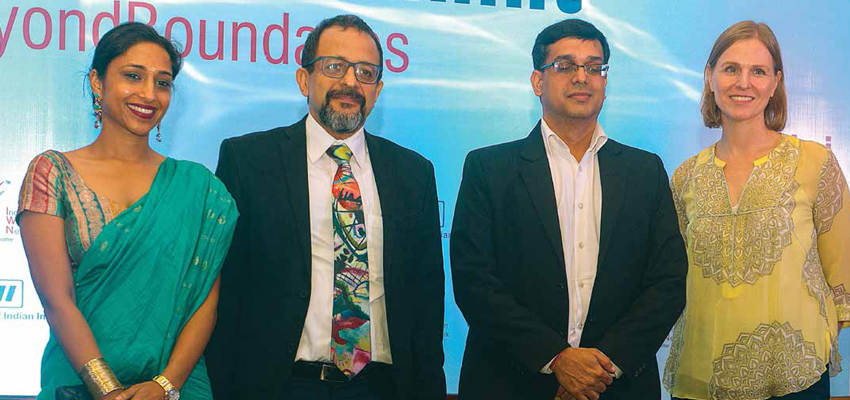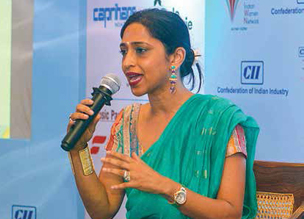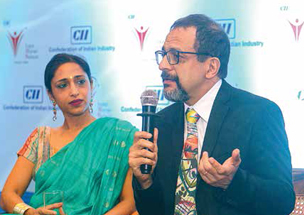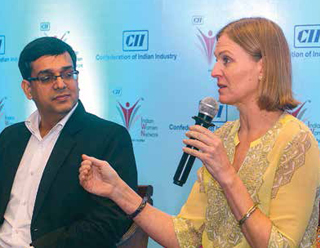Building Resilience

In order to stand up with one’s head held high one needs to build resilience. The question is, how to build that resilience? Why is resilience important in our lives and how does resilience help to overcome hurdles in our lives? At a recently held CII-WomeNation Conference in Mumbai, industry experts shared their views on the subject. Panellists of the session were Dr Prakriti Poddar, CEO, Mind Over Image Consulting; Dr Kersi Chavda, Consultant and Psychiatrist, Hinduja National Hospital; Lalit Saraswat, Chairman, CII Goa State Council and Director, Sancoale Shipping Ltd (moderator) and Dr Tamara Zweck, Director, Sports and Manual Physiotherapist, 206 Optimal Movement
‘If you cannot incorporate resilience in yourself, if you cannot teach your kids to be resilient, if your company, the workplace does not have people who are resilient enough, you are going to land up having this outbreak of depression and anxiety’
- Dr Kersi Chavda
‘According to a Japanese saying, whenever there is a crack in a vase, they fill it with gold. I always think of that as broken souls. If you actually open up the wound and heal it, and find the power through that, you find the sun shining through the pain you got’
- Dr Prakriti Poddar

Dr Prakriti Poddar: Despite the fact that the families we have are educated, one of my company keynotes is ‘silence todo’. We don’t break those silences, and we make sure that we uphold our own family circles and we do not give our-selves the opportunity to open up. When I deal with cases, I don’t call them victims of abuse; you are not a victim of abuse. Even though I went through such experience for many years, I was not a victim of abuse; what happened was that it made me a transformer of this abuse. When you are talking about resilience it is about how you teach men and women to transform that suffering that they have been in and really empower themselves. That is the keynote to take because how you use that abuse is important. According to a Japanese saying, whenever there is a crack in a vase, they fill it with gold. I always think of that as broken souls. If you actually open up the wound and heal it, and find the power through that, you find the sun shining through the pain you got. You manifested your power and that power which you manifested cannot be broken because you learnt. Kids who got punished more frequently in school are more resilient and have better risk-taking abilities; if they fail, they try to succeed again. We, women, need to accept that we are in a situation where we are constantly battling for our position and I don’t think we should talk in an entitled manner because every single person is going through that. The idea is to keep the locus of control internal. Every time you start working with yourself or with communities, understand that the moment you grow you are able to give. Resilience is checking these biases that you keep in your heart because when we are healing and we are working towards healing, you realise that while keeping the body, mind and spirit we tap into our cells as well. If your body is not in sync and not really healing as well, you know there are issues that are dealt with and those issues are your power.
‘India has now become the suicide capital of the world. We are third in the world of depression. We have a high incidence of drug abuse, and all of this has its ramifications in the fact that we are not resilient enough’
- Dr Kersi Chavda

Dr Kersi Chavda: Ten years ago we came across a little kid. He had cerebral palsy, he couldn’t walk, he was actually scuttling around. He got into school, he managed to get English education, pushed through his college, managed to do his BBA, started working in a fairly nice financial workplace and then ‘Gullyboy’ happened he discovered that he had the ability to rap. We had a kid with crutches who could rap. His name is Ajay, you can find him on YouTube. He has now become so famous in his locality, in addition to working in that financial firm which he fairly well enjoys, he spends all his spare time teaching kids of his chawl to rap. That is resilience. More importantly, his younger sister has Down’s syndrome. They are three kids, the younger kid is normal and doing well. Their dad is a drunkard, doesn’t do much, mom looks after them. We are talking of resilience and women. This lady in the chawl, she used to go with him since he could not travel, take him by bus till he could travel on this own. The bus conductor started getting to know him, he would help him off the bus. Bombay is a soft society like that. But when she went to school, because the school was far away, she could not afford going up and down, so she would wait for him for six hours in the school, pick him up, take him to tuition, wait outside the tuition class, come back home, prepare food. And she would take the kid with the Down’s Syndrome to another school, a school for special kids. That woman has resilience. When we talk about resilience, it is nice to talk about empowerment, it is nice to talk about getting it out within us. But we have actually got live cases in front of us.
The most important thing associated with resilience is that if you cannot incorporate resilience in yourself, if you cannot teach your kids to be resilient, if your company, the workplace does not have people who are resilient enough, you are going to land up having this outbreak of depression and anxiety. India has now become the suicide capital of the world. India is going to be the country with the most autistic kids in the world. We are third in the world of depression. We have a high incidence of drug abuse, and all of this has its ramifications in the fact that we are not resilient enough, maybe our education doesn’t build us up to cope with the problems we face in life. Maybe we look at obstacles and say, I am not going to try, instead of looking at obstacles as stepping stones to success. Maybe that’s where the change has to come in.
It is the mother who will do what she has to do with the kid. Resilience is great, but mental health is much more important.
‘A CEO is nothing different from an elite athlete, you have to be strong in order to be successful in what you are doing. You get up and do it because you enjoy it. You have grown a lot in your career because of the experiences’
- Dr Tamara Zweck
Lalit Saraswat: Tamara, you worked a lot with sports teams around the world, what is your parallel for resil-ient sports persons or sports teams and CEOs?

Dr Tamara Zweck: Actually the trigger comes from when I was working with the New Zealand cricket team during the World Cup which re-minds me of a specific example. We were travel-ling from Nagpur to Ahmedabad. After practice sessions, it got really hot. There were some young people in the cricket team who were in India for the very first time so it was very overwhelming. India is very overwhelming on very different levels. I had one young player coming in after the practice session. He was vomiting, feeling very sick. He wasn’t very well, he said, he wasn’t sure he could go to the next practice session. He wanted a doctor. He thought it could be food poisoning. He was very panicky. It was two in the afternoon. I said, why you don’t go to bed. In the end, New Zealand went into the semi-finals.
They were a very good bunch of talented individuals. The only thing they lacked was the fire in their guts. The young guy who was in that situation is Kane Williamson who is now the captain of the New Zealand cricket team. Watching him now over the last nine years developing into this leader of the New Zealand cricket team and also the leader of almost the best cricket team in the world at the moment, is inspiring. It is inspiring because he was once very young and very shy. He was also very reflective. He took every opportunity and reflected on it a lot. He could see that as he progressed through his career, and that’s where he is today.
Kane Williamson is the leader of his team. A lot of the people present here are leaders of your companies. A CEO is nothing different from an elite athlete, you have to be strong in order to be successful in what you are doing. You get up and do it because you enjoy it. You have grown a lot in your career because of the experiences. You have learned from your experiences, you have been able to reflect upon them and adapt accordingly. It is a lot like that for athletes. Especially when you are returning from injury.
Lalit: What do women leaders need to do to build resilience?
Prakriti: We have a formula in our company, it is not only for women, it is for all. There are four verticals of being. We focus on the mindset and we kind of understand and personalise it each to each person. We work with nutrition because if what you are putting into your body is not aiding you, you are not feeling better. Your mind is connected to your body, to the physical self, so you need exercise. Then moving on to the recovery part-the fourth vertical we have is recovery. If you do not have time to take a break, you are not going to be successful.
Lalit: In your opinion, what are the specific things that we as parents should do in order to build resilience in children?
Kersi: There is research done on this topic and one of the important things that a kid should do is to experience what is called success experience. Success doesn’t have to be academic which is typically what Indian parents look for. But you can be successful in other things as well. Another thing that is important is related to what we call ‘connected-ness’. Somehow we are becoming very isolated and it has often been found that resilience implies being connected to people. It is imperative for us parents to get our kids to interconnect, maybe put them in a club, playgroups. Look at obstacles as if it is a part of your life and not your entire life. So if you are a kid who had a facture, life doesn’t come to an end. It is not that you are the fracture, there is so much more in you than that fracture is. Sometimes we tend to forget that. I believe that having a spiritual backing seems to help, I think that too helps in building resilience.
Lalit: What practical tips would you give to build resilience every day through their activities?
Tamara: Firstly, you must make sure that you help yourself first and then help others. You should be thinking about yourself first when you go home and the children are home, and things are bombarding you. You need to make time for yourself. I say this to patients all the time. It is difficult, if you don’t take a break something will break you.
The other big thing that we talk about is sleep. If people could pay for sleep, we would probably do a lot of it. It is one of the best things to access for good health, for a healthy mind and a healthy body. Your nervous system needs the rest for your body to recover.